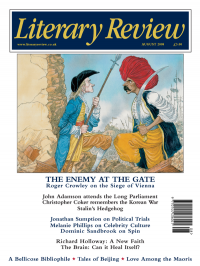Lucy Wooding
For Queen and Country
Burghley: William Cecil at the Court of Elizabeth I
By Stephen Alford
Yale University Press 412pp £25
As a nation, we love the Tudors. We treasure their culture, poetry and theatre, their palaces, pictures and costumes. We cherish their armour, their castles and, to a certain extent, their prejudices about foreigners. Above all, we delight in their characters – bold, histrionic, tortured, vengeful and flamboyant. For Tudor historians, this is both a blessing and a curse. It is great that so many people are fascinated by this period in history, but this kind of enthusiasm inevitably perverts history. We want to improve on the story, embellish the characters. We want it to be like the historical novel, or the TV series, without the ambiguities and uncertainties of history.
As Stephen Alford points out at the start of this biography, William Cecil is a character likely to fall victim to this yearning for historical glamour. We would rather focus on Elizabeth in all her glory than on the ‘bureaucrat dressed in sombre black’ who slips quietly in and out

Sign Up to our newsletter
Receive free articles, highlights from the archive, news, details of prizes, and much more.@Lit_Review
Follow Literary Review on Twitter
Twitter Feed
Under its longest-serving editor, Graydon Carter, Vanity Fair was that rare thing – a New York society magazine that published serious journalism.
@PeterPeteryork looks at what Carter got right.
Peter York - Deluxe Editions
Peter York: Deluxe Editions - When the Going Was Good: An Editor’s Adventures During the Last Golden Age of Magazines by Graydon Carter
literaryreview.co.uk
Henry James returned to America in 1904 with three objectives: to see his brother William, to deliver a series of lectures on Balzac, and to gather material for a pair of books about modern America.
Peter Rose follows James out west.
Peter Rose - The Restless Analyst
Peter Rose: The Restless Analyst - Henry James Comes Home: Rediscovering America in the Gilded Age by Peter Brooks...
literaryreview.co.uk
Vladimir Putin served his apprenticeship in the KGB toward the end of the Cold War, a period during which Western societies were infiltrated by so-called 'illegals'.
Piers Brendon examines how the culture of Soviet spycraft shaped his thinking.
Piers Brendon - Tinker, Tailor, Sleeper, Troll
Piers Brendon: Tinker, Tailor, Sleeper, Troll - The Illegals: Russia’s Most Audacious Spies and the Plot to Infiltrate the West by Shaun Walker
literaryreview.co.uk